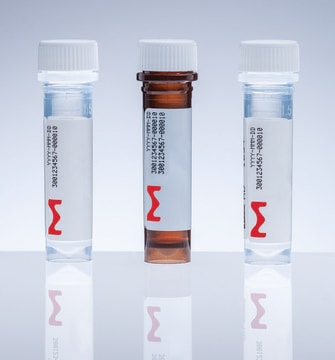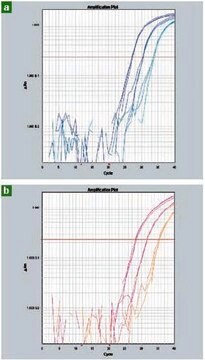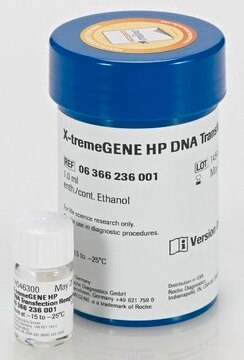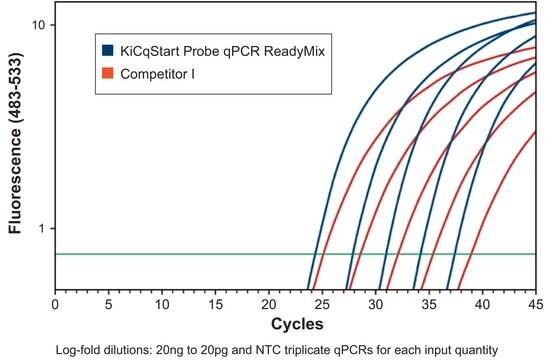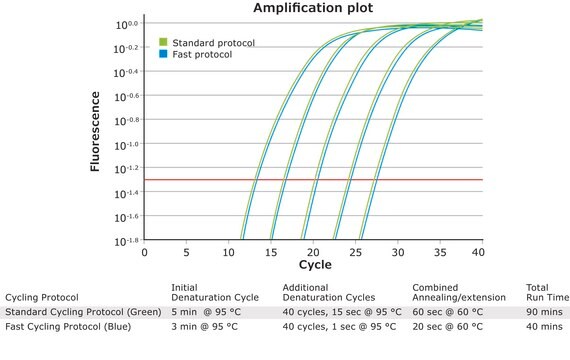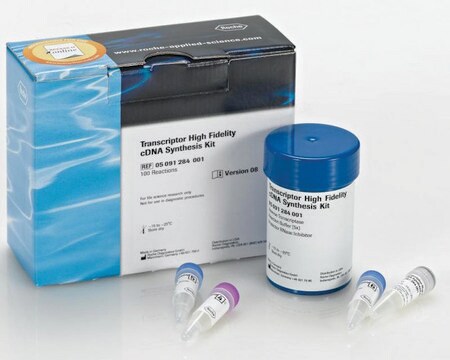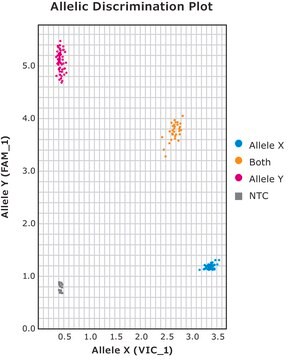FSTMPMMRO
Roche
FastStart TaqMan® Probe Master
sufficient for 100 reactions, sufficient for 500 reactions, sufficient for 2000 reactions, suitable for qPCR, suitable for RT-qPCR
About This Item
Productos recomendados
usage
sufficient for 100 reactions
sufficient for 2000 reactions
sufficient for 500 reactions
Quality Level
feature
dNTPs included: no
hotstart
manufacturer/tradename
Roche
packaging
pkg of 100 x 50 μL reactions (04673409001)
pkg of 2000 x 50 μL reactions (04673433001)
pkg of 500 x 50 μL reactions (04673417001)
technique(s)
RT-qPCR: suitable
qPCR: suitable
input
purified DNA
detection method
probe-based
General description
Hot start protocols have been also been shown to significantly improve the specificity and yield of PCR. Heat-labile blocking groups on some of the amino acid residues of FastStart Taq DNA Polymerase make the modified enzyme inactive at room temperature. Therefore, there is no elongation during the period when primers can non-specifically bind. The FastStart Taq DNA Polymerase is activated by removing the blocking groups at a high temperature (i.e., a pre-incubation step at +95°C).
This FastStart TaqMan® Probe Master can be used for the amplification and detection of any DNA or cDNA target, including those that are GC- or AT-rich. However, you would need to adapt your detection protocol to the reaction conditions of the particular real-time PCR instrument used and design a specific hydrolysis probe and PCR primers for each target.
Combination of this master mix with our Transcriptor First Strand cDNA Synthesis Kit achieves excellent results in two-step qRT-PCR.
Application
- quantitative, real-time DNA-detection assays
- qPCR and two-step reverse transcription (RT)-qPCR
- in the hydrolysis probe detection format
Features and Benefits
- Increase qPCR sensitivity and specificity:
- Use it with any probe-based assay:
- Amplify and detect a broad range of DNA or cDNA targets:
- Use with any real-time qPCR instrument other than the LightCycler® Instruments:
- Visualize amplification products on agarose gels.
- Use robotic pipetting stations to set up qPCR reactions:
- Prevent carryover contamination:
Components
Quality
Other Notes
In principle, the FastStart TaqMan® Probe Master can be used for the amplification and detection of any DNA or cDNA target, including those that are GC- or AT-rich. However, for each target, you would need:
- to adapt your detection protocol to the reaction conditions of your real-time PCR instrument, and
- design specific PCR primers and hydrolysis probes for the target.
See the Operator′s Manual of your real-time PCR instrument for general recommendations.
Two forms available
The master mix is available in two forms – one that contains the ROX reference dye and one without ROX.
Preventing carryover contamination
This master contains dUTP, which will be incorporated into PCR products to help prevent false positives resulting from carryover contamination. In subsequent PCRs, you can add Uracil-DNA Glycosylase to degrade any uracil-containing carryover contaminants (amplification products from previous PCRs).
qRT-PCR
Combine this master mix with our Transcriptor First Strand cDNA Synthesis Kit for two-step qRT-PCR. This kit gives excellent results and works efficiently with all real-time PCR instruments.
Legal Information
Storage Class
12 - Non Combustible Liquids
wgk_germany
WGK 1
flash_point_f
does not flash
flash_point_c
does not flash
Certificados de análisis (COA)
Busque Certificados de análisis (COA) introduciendo el número de lote del producto. Los números de lote se encuentran en la etiqueta del producto después de las palabras «Lot» o «Batch»
¿Ya tiene este producto?
Encuentre la documentación para los productos que ha comprado recientemente en la Biblioteca de documentos.
Los clientes también vieron
Artículos
A PCR master mix is a batch of PCR or RT-PCR reagents that can be divided among many PCR reaction tubes. It usually includes DNA polymerase, dNTPs, MgCl2 and buffer. Make your own master mix or choose a commercial one.
The purpose of Hot Start PCR is to inhibit the PCR reaction in order to reduce nonspecific amplification, prevent the formation of primer dimers, and increase product yields.
Contenido relacionado
Polymerase chain reaction (PCR) is a technique for amplifying nucleic acid molecules and is commonly used in many applications, including RT-PCR, hot start PCR, end point PCR and more.
RT-qPCR, or quantitative reverse transcription PCR, combines the effects of reverse transcription and quantitative PCR or real-time PCR to amplify and detect specific targets. RT-qPCR has a variety of applications including quantifying gene expression levels, validating RNA interference (RNAi), and detecting pathogens such as viruses.
Nuestro equipo de científicos tiene experiencia en todas las áreas de investigación: Ciencias de la vida, Ciencia de los materiales, Síntesis química, Cromatografía, Analítica y muchas otras.
Póngase en contacto con el Servicio técnico